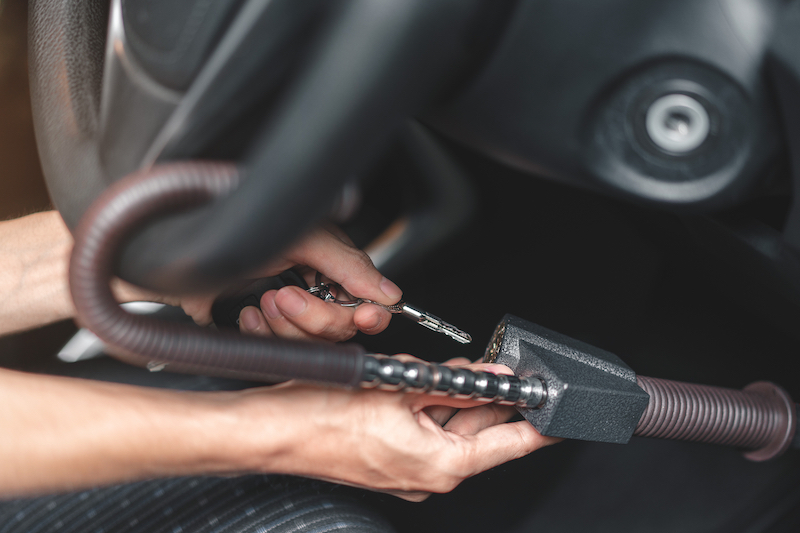How Can I Keep my Car on Lock from TikTok?
Protect your ride from the “Kia Challenge”

Protect your ride from the “Kia Challenge”

What started as a TikTok tutorial on how to break in and steal Hyundai and Kia vehicles with key-based ignition systems has quickly turned into (or at the very least escalated) a large-scale grand theft auto situation.
If you hadn’t already seen the news, your jaw might have just dropped, eyes gaping, and you asked yourself, “Is this even real life?” Unfortunately, the answer is: Yes.
The “Kia Challenge” has been taking social media—and vulnerable cars—by storm. A video by the Milwaukee-based “Kia Boyz” encourages viewers to break in and steal Hyundai and Kia car models that have key-based ignition systems (rather than the push-button start systems that are found in newer vehicles).
At Lemonade Car, we want you to feel protected behind the wheel. We also want your car to stay safe when you park it. If you’re worried about how this viral hack could impact you and your car, we’re here to help you protect your car against potential thieves.
In the case of the “Kia Challenge”, the uptick in thefts mainly affects 2011-2021 model Kia’s and Hyundai’s made between 2015 and 2021.
These model years are being targeted because, unlike newer models, they don’t come with an immobilizer system—a piece of hardware that prevents the engine from starting unless the proper key is recognized.
Without an immobilizer in place, it’s possible to start these models without a key (or “hotwiring”) and drive off. All a thief would really need to snatch this kind of car is a USB charger cable, a screwdriver, and a couple minutes of uninterrupted time.
We obviously would never condone a felony and we don’t want anybody to attempt this or any harmful social media challenge. Because at the end of the day, it would really really suck to be the victim of the “Kia Challenge”.
Just about any car can be vulnerable to theft, that’s why it’s important—regardless of its make or model year—to arm your ride with car insurance coverage. When you include comprehensive coverage on your policy, you could be paid out the actual cash value of the car if it can’t be recovered.
Or if it is recovered, but the window was busted during the attempted break in, comprehensive insurance could also cover damage to the car itself (but not theft or damage to your things inside like your phone or laptop—that kind of coverage is available with a Lemonade homeowners or renters policy!).
Needless to say, even if you can get a pay out to help replace your stolen car, it’s better to take some preventative measures to protect it from theft in the first place. Being proactive could save you from a huge shock and headache later.

An anti-theft device can make it physically impossible for car thieves to steal your car, scare them away by attracting attention to a theft in progress, or help track down your stolen vehicle. Not to mention—installing an anti-theft device could decrease your car insurance premiums.
For example, you could stop a thief in their tracks with an alarm system—which activates automatically when you turn the ignition off or shut your car door. Look for a system whose main function is to make a lot of noise and draw a lot of attention with its loud alarm and/or flashing lights if someone tries to break into your car. It’s a plus if it comes with an engine immobilizer that’s fairly easy to install.
Using a steering wheel lock could also help prevent a theft. Kia and Hyundai have been partnering with local police departments across the US in an effort to encourage the use of—and in some cases handing out—steering wheel locks to vulnerable drivers.
Even if you go the extra mile to protect your car from thieves—like equipping it with a steering wheel lock, a motion sensor alarm, an immobilizer system, and a sign on the driver’s window that reads “Kia Boyz I’m watching you” (please don’t actually try this last one)—there are some even easier safety measures that you should take every time you park your car.
In addition, on February 14, 2023 both Kia and Hyundai launched service campaigns to help protect millions of their cars that have a “turn-key-to-start” ignition. The campaign involves a free anti-theft software upgrade that prevents the cars from starting if a thief attempts to steal them using the “Kia Challenge” method.
The National Highway Traffic Safety Administration (NHTSA) urges the owners of these vulnerable vehicles to contact Hyundai (toll-free at 800-633-5151) or Kia (toll-free at 800-333-4542) for more information about the free update.
So you might be curious, or panicked, about what thieves are doing with the stolen cars. Though it’s common for stolen cars to get sold or exported, in many of the “Kia Challenge” cases, the thieves are just taking the stolen Kia’s and Hyundai’s for a joyride, perhaps damaging or gutting them, and then dropping or stashing them.
The car may not even get that far from where it was stolen and could still be recovered. Like this abandoned Kia that a Cook County, Illinois Sheriff’s officer found on an expressway, or the drivers in Dayton, Ohio whose cars were recovered by police but were badly damaged and needed costly repairs.

Having a GPS tracking device or vehicle recovery system in your car could help the police locate and retrieve it if it’s stolen.
But it still might come home pretty beat up. Including comprehensive coverage on your car insurance policy could help to pay for the repairs for the damage done by the thieves (or to help pay to replace it if it’s a total loss).
The power of technology can be used for both good or evil. For instance, a viral video on social media may or may not be to blame for a drastic escalation in car theft. Yet it’s left drivers—especially of Kia and Hyundai models—at the mercy of teenagers with smartphones and USB cables.
But on the other end of the spectrum, tech, when combined with human empathy, can help make the world a better place. Take the Lemonade app for example. It was built to make everything about insurance simple and transparent, was designed for social impact, and offers coverage for things like car, pet health, renters, and homeowners.
Because you deserve an easy way to help protect yourself, your loved ones, and the things you care about (including the planet).
Please note: Lemonade articles and other editorial content are meant for educational purposes only, and should not be relied upon instead of professional legal, insurance or financial advice. The content of these educational articles does not alter the terms, conditions, exclusions, or limitations of policies issued by Lemonade, which differ according to your state of residence. While we regularly review previously published content to ensure it is accurate and up-to-date, there may be instances in which legal conditions or policy details have changed since publication. Any hypothetical examples used in Lemonade editorial content are purely expositional. Hypothetical examples do not alter or bind Lemonade to any application of your insurance policy to the particular facts and circumstances of any actual claim.